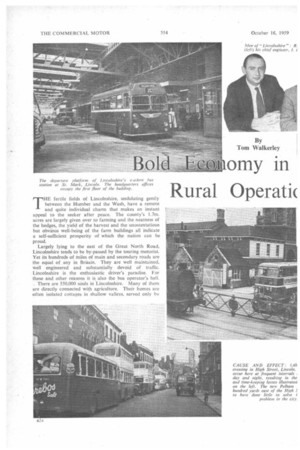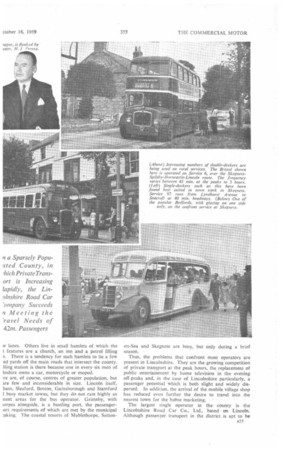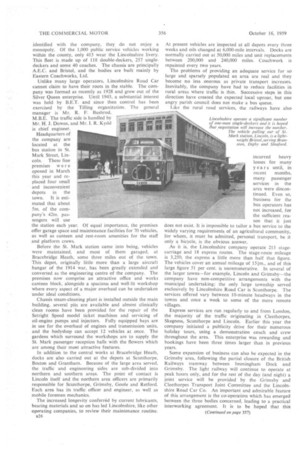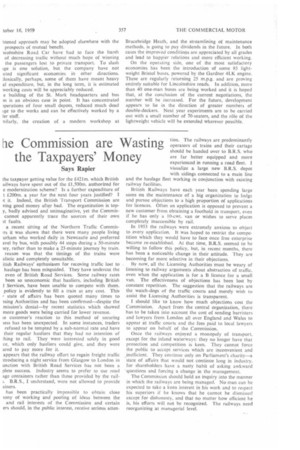omy in Rural Operatic
Page 58

Page 59

Page 60

Page 63

If you've noticed an error in this article please click here to report it so we can fix it.
By Tom Walkerley
THE fertile fields of Lincolnshire, undulating gently between the Humber and the Wash, have a remote and quite individual charm that makes an instant appeal to the seeker after peace. The county's 1.7m. acres are largely given over to farming and the neatness of the hedges, the yield of the harvest and the unostentatious but obvious well-being of the farm buildings all indicate a self-sufficient prosperity of which the nation can be proud.
Largely lying to the east of the Great North Road, Lincolnshire tends to be by-passed by the touring motorist. Yet its hundreds of miles of main and secondary roads are the equal of any in Britain. They are well maintained, well engineered and substantially devoid of traffic. Lincolnshire is the enthusiastic driver's paradise. For these and other reasons it is also the bus operator's hell. -There are 550,000 souls in Lincolnshire. Many of them are directly connected with agriculture. Their homes are often isolated cottages in shallow valleys, served only by
w lanes. Others live in small hamlets of which the t features are a church, an inn and• a petrol filling I. There is a tendency for such hamlets to lie a few ed yards off the main roads that intersect the county. Luling station is there because one in every six men of lnshire owns a car, motorcycle or moped.
:re are, of course, centres of greater population, but are few and inconsiderable •in size. Lincoln itself, ham, Sleaford, Boston, Gainsborough and Stamford 1 busy market towns, but they do not rate highly as nent areas for the bus operator. Grimsby, with iorpes alongside, is a bustling port, the passengerort requirements of which are met by the municipal :aking. The coastal resorts of Mablethorpe. Sutton
on-Sea and Skegness are busy, but only during a brief season.
Thus, the problems that confront most operators are present in Lincolnshire. They are the growing competition of private transport at the peak hours, the replacement of public entertainment by home television in the evening off-peaks and, in the case of Lincolnshire particularly, a passenger potential which is both slight and widely dispersed. In addition, the arrival of the mobile village shop has 'reduced even further the desire to travel into the
nearest town for the holm marketing. • The largest single operator in the county is the Lincolnshire Road Car Co., Ltd., based on Lincoln. Although passenger transport in the district is apt to be identified with the company, they do not enjoy a monopoly. Of the 1,000 public service vehicles working within the county, only 415 wear the Lincolnshire livery. This fleet is made up of 118 double-deckers, 257 singledeckers and some 40 coaches. The chassis are principally A.E.C. and Bristol, and the bodies are built mainly by Eastern Coachworks, Ltd.
Unlike many large operators, Lincolnshire Road Car cannot claim to have their roots in the stable. The company was formed as recently as 1928 and grew out of the Silver Queen enterprise. Until 1943, a substantial interest was held by B.E.T. and since then control has been exercised by the Tilling organization. The general manager is Mr. R. F. Bushrod,
M.B.E. The traffic side is handled by lagwiosoloADaa
Mr. H. J. Downs, and Mr. I. R. Kydd is chief engineer. Headquarters of the company are located at the bus station in St. Mark Street, Lin coln. These fine premises were opened in March this year and re placed four small and inconvenient depots in the town. It is esti mated that about 5m. of the company's 42m. passengers will use the station each year. Of equal importance, the premises offer garage space and maintenance facilities for 70 vehicles, as well as canteen and rest-room amenities for the staff and platform crews.
Before the St. Mark station came into being, vehicles were maintained, and most of them garaged, at Bracebridge Heath, some three miles out of the town. This depot, originally little more than a large aircraft hangar of the 1914 war, has been greatly extended and converted as the engineering centre of the company. The premises now comprise an attractive office and works canteen block, alongside a spacious and well-lit workshop where every aspect of a major overhaul can be undertaken under ideal conditions.
Chassis steam-cleaning plant is installed outside the main building, several pits are available and almost clinically clean rooms have been provided for the repair of the Setright Speed model ticket machines and servicing of oil-engine pumps and injectors. Fully equipped bays are in use for the overhaul of engines and transmission units, and the bodyshop can accept 12 vehicles at once. The gardens which surround the workshops are to supply the St_ Mark passenger reception halls with the flowers which are among their most attractive features.
In addition to the central works at Bracebridge Heath, docks are also carried out at the depots at Scunthorpe, Boston and Grantham. Because of the large area served, the traffic and engineering sides are sub-divided into northern and southern areas. The point of contact is Lincoln itself and the northern area officers are primarily responsible for Scunthorpe, Grimsby, Goole and Retford. Each area has its traffic officer and engineer, as well as mobile foremen mechanics.
The increased longevity conferred by current lubricants, bearing materials and so on has led Lincolnshire, like other operating companies, to review their maintenance routine.
1326 At present vehicles are inspected at all depots every three weeks and oils changed at 6,000-mile intervals_ Docks are normally carried out at 50,000 miles and unit replacements between 200,000 and 240,000 miles. Coachwork is repainted every two years.
The problems of providing an adequate service for so large and sparsely populated an area are real and they become no less onerous as private transport increases. Inevitably, the company have had to reduce facilities in rural areas where traffic is thin. Successive steps in this direction have created the expected local uproar, but one angry parish council does not make a bus queue.
Like the rural road services, the railways have also incurred heavy losses for many years until, in recent months, many passenger services in the area were discontinued. Even so, business for the bus operators has not increased, for the sufficient reason that it just does not exist. It is impossible to tailor a bus service to the widely varying requirements of an agricultural community, for whom, it must be admitted, personal transport, be it only a bicycle, is the obvious answer.
As it is, the Lincolnshire company operate 213 stagecarriage and 18 express routes. The stage-route mileage is 3,250, the express a little more than half that figure. The vehicles cover an annual mileage of 154m., and of this large figure 51 per cent. is unremunerative. In several of the larger towns—for example, Lincoln and Grimsby—the company have non-competitive arrangements with the municipal undertaking; the only large township served exclusively by Lincolnshire Road Car is Scunthorpe. The services offered vary between 10-minute headways in the towns and once a week to some of the more remote villages.
Express services are run regularly to and from London, the majority of the traffic originating in Cleethorpes, Skegness, Scunthorpe and Lincoln. Earlier this year the company initiated a publicity drive for their numerous holiday tours, using a demonstration coach and crew throughout the area. This enterprise was rewarding and bookings have been three times larger than in previous years.
Some expansion of business can also be expected in the Grimsby area, following the partial closure of the British Railways tramway between Immingham Dock and Grimsby. The light railway will continue to operate at peak hours only, and for the rest of the day (and night) a joint service will be provided by the Grimsby and Cleethorpes Transport Joint Committee and the Lincolnshire Road Car Co. An important and admirable feature of this arrangement is the co-operation which has emerged between the three bodies concerned, leading to a practical interworking agreement_ It is to be hoped that this htened approach may be adopted elsewhere with the prospects of mutual benefit.
Icolnshire Road. Car have had to face the harsh of decreasing traffic without much hope of winning the passengers lost to private transport. To slash ige is one solution, but the company have not led significant economies in other directions. Joxically, perhaps, some of them have meant heavy al expenditure, but, in the long term, it is estimated working costs will be appreciably reduced.
e building of the St. Mark headquarters and bus m is an obvious case in point. It has concentrated )perations of four small depots, reduced much dead ige to the works and can be effectively worked by a ler staff.
nilarly, the creation of a modern workshop at Bracebridge Heath, and the streamlining of maintenance methods, is going to pay dividends in the future. In both cases the improved conditions are appreciated by all grades and lead to happier relations and more efficient working.
On the operating side, one of the most satisfactory economies has been the introduction of some 85 lightweight Bristol buses, powered by the Gardner 4LK engine. These are regularly returning 25 m.p.g. and are proving entirely suitable for Lincolnshire roads. In addition, more than 40 one-man buses are being worked and it is hoped that, at the conclusion of the current negotiations, the number will be increased. For the future, development appears to lie in the direction of greater numbers of double-deckers. Next year experiments are to be carried out with a small number of 70-seaters, and the role of the lightweight vehicle will be extended wherever possible.




















































































































